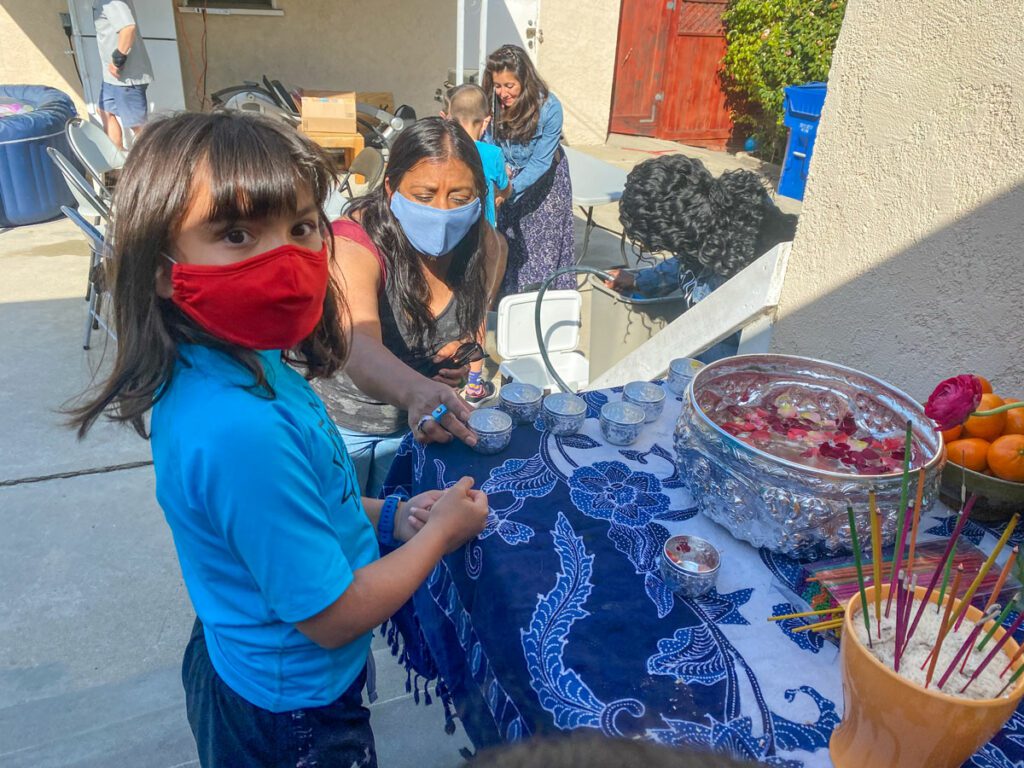Growing up in America as a first-generation immigrant was a challenge. I never quite felt like I fully belonged. I was “too American” to be fully Thai and too “Thai” to be fully American.
My parents are devout Theravada Buddhists, and they practice Buddhist rituals as a means of connecting to their Thai-ness and to ease the longing for their distant homeland. These daily rituals are anchors in their lives. Just like they did when I was growing up, my octogenarian parents still pray every day. They make food for religious offerings to the Lord Buddha statue in their home, and they listen to Buddhist monks lecturing on Buddhist texts and themes. They meditate twice daily. These practices provide them with peace of mind, stability, and strength in their golden years.
“I finally understood why rituals are important: It is not the form they take, but the meaning you make for yourself and each other.”
I, however, am a lapsed Buddhist. When I was younger, Buddhist rituals felt like an obligation, which rarely resonated in any meaningful way with me. Now, I seldom go to temple, make offerings, or pray regularly. For much of my adult life I found these rituals time-consuming. I was unsure what purpose they could bring to my full, chaotic life. My family, my career, and my friendships took precedence over the ancient rituals of my youth.
“My family focuses each day on finding different ways to help others in small, meaningful ways.”
My nuclear family is hyphenated in so many ways. My eleven-year-old twins, one boy and one girl, are bi-racial, bi-religious, bi-ethnic, and bi-cultural. Their father, my husband, is an American Ashkenazi Jew of Eastern European and Slavic descent, while my family is Thai Chinese Buddhist. Most of my husband’s family, including my in-laws, live within five miles of us in Los Angeles. Their proximity and my openness to sharing their culture has made Jewish holidays and rituals a part of our regular lives. On the other hand, my parents and sister currently live in the Bay Area, making my children’s experience of Thai culture and religion feel further away.
During the pandemic, my in-laws, whom I love, moved in with our family for ten months. I realized for the first time just how much Judaism is a part of their lives. Being cloistered and missing my parents, my sister, and my Thai community, I began to wish that my children could experience the Thai and Buddhist sides of their heritage more. Before the pandemic whenever I felt that my children were missing out on being half Thai, we’d go to the Thai temple, Thai supermarket, or a restaurant in Thai Town. The pandemic made those options less viable.


My husband could see my sadness and reminded me that many of the Buddhist practices he remembered my parents doing were done at their home. Was there something we could do at our house? When Thai New Year was coming, he wondered if maybe we could observe the occasion—perhaps by inviting friends in our pod for a socially distanced meal in our backyard? I researched and relearned what I’d experienced as a child. Then I decided to do more than just cook a meal. I wanted my children to understand the significance of Thai New Year, or Songkran. I wanted it to be an opportunity to learn and share my cultural history and beliefs around rebirth and renewal through ritualistic cleansing.
We delved into the history and meaning of Buddhist rituals practiced at Thai temples, from bathing the Buddha statues to washing the hands and feet of our elders, to making traditional offerings to Buddha to praying for a happy and healthy new year. Although we could not go to the temple for a festival, we created one in our backyard. We built a Buddhist altar, made offerings, taught our friends about the rituals, then had a huge party with a traditional water fight.
Sharing our Thai Buddhist culture with our multi-racial, ethnic, and religious friends and family was magical and joyful. More importantly, it was a touchstone for my family. We connected to our Thai-ness and learned how ritual can help build meaning, community, and bonds.
Through this experience, I finally understood why rituals are important: It is not the form they take, but the meaning you make for yourself and each other. The joy of the day was about purposefully sharing and building new experiences and traditions together.
Thai New Year every year has become a foundation of my family’s understanding of their Buddhist heritage and the importance of creating rituals and traditions. I may not pray every day or give alms to monks or visit temples often; however, what I learned from Buddhism and the practice of ritual is to live with purpose. This purpose is anchored by meaningful ceremonies, large and small, to help cultivate stability, openness, and new perspectives. Nowadays, I find myself taking fifteen minutes twice a day—when I wake and before I go to sleep—to breathe, check-in on my body, clear my mind, and set a loving intention for myself and those around me. I practice breathing with my children in difficult situations and release the pain and stress that consumes us in the moment. My family focuses each day on finding different ways to help others in small, meaningful ways, and we practice showing gratitude.
At the end of the day, we may not be traditional Buddhists practicing the structured rituals of my youth, but these smaller rituals have given us the gifts of more hope, joy, and peace of mind.
This article was published in the May 2024 issue of Bodhi Leaves: The Asian American Buddhist Monthly.


